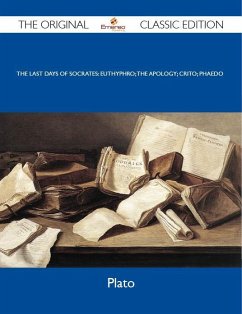As Socrates abstained from recording his philosophies, we must thank Plato for having the insight to preserve Socratic thoughts for posterity. As a student of Socrates, it seems that Plato, through his own writings, attempts to preserve the memory of his well respected teacher.
In The Last Days of Socrates, Plato begins with Euthyphro and we see the Socratic method in action. Socrates and Euthyphro discuss the nature of piety, and through a serious of thought provoking questions, Socrates argues for what he feels is the proper relationship between Man and God.
Next, Plato discusses the trial of Socrates by the Athenian aristocracy. Again, we see Socrates using his rhetorical skills in illustrating the hypocrisy and prejudice pervading throughout the Athenian government. Socrates discusses what role a good citizen should play in government. He announces his being a gadfly on the hide of the establishment, and we also find Socrates exposing his own intelligence by claiming that he, in fact, knows very little. The Apology is by far my personal favorite section of the book.
After Socrates conviction, we find him discussing the morality of obeying or breaking laws in Crito. He meets with one of his close friends and the two discuss Socrates options in regard to his death sentence. Here we see Socrates espouse the belief that it is acceptable to break an unjust law, however, one must also accept the consequences for breaking said law in order to preserve the stability of society.
The Last Days of Socrates tackles many complex issues which are as relevant today as they were when first committed to paper in the 4th century B.C. This should be standard reading for any introductory course in political theory, and a must have for anyone interested in philosophy or ethics.
In The Last Days of Socrates, Plato begins with Euthyphro and we see the Socratic method in action. Socrates and Euthyphro discuss the nature of piety, and through a serious of thought provoking questions, Socrates argues for what he feels is the proper relationship between Man and God.
Next, Plato discusses the trial of Socrates by the Athenian aristocracy. Again, we see Socrates using his rhetorical skills in illustrating the hypocrisy and prejudice pervading throughout the Athenian government. Socrates discusses what role a good citizen should play in government. He announces his being a gadfly on the hide of the establishment, and we also find Socrates exposing his own intelligence by claiming that he, in fact, knows very little. The Apology is by far my personal favorite section of the book.
After Socrates conviction, we find him discussing the morality of obeying or breaking laws in Crito. He meets with one of his close friends and the two discuss Socrates options in regard to his death sentence. Here we see Socrates espouse the belief that it is acceptable to break an unjust law, however, one must also accept the consequences for breaking said law in order to preserve the stability of society.
The Last Days of Socrates tackles many complex issues which are as relevant today as they were when first committed to paper in the 4th century B.C. This should be standard reading for any introductory course in political theory, and a must have for anyone interested in philosophy or ethics.
Dieser Download kann aus rechtlichen Gründen nur mit Rechnungsadresse in A, D ausgeliefert werden.


